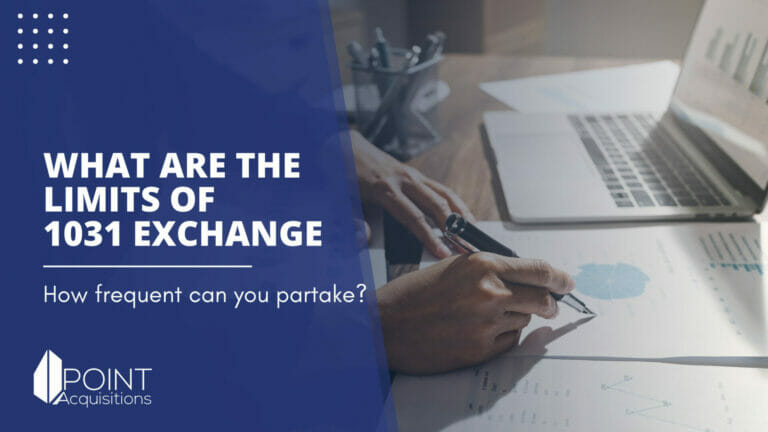
How often can you do a 1031 exchange: All You Need To Know
To understand how a 1031 exchange works, it is important first to understand the rules and regulations that come with it. How often can you do a 1031 exchange? What happens if you run out of time in a 1031 exchange? In this blog post, we’ll go over everything you need to know about the 1031 exchange so that you can make the most informed decision.

Table of Contents
What is a 1031 Exchange?
A 1031 exchange is a section of the United States tax code that allows taxpayers to defer taxes on selling real estate or other investments by reinvesting the proceeds in a like-kind asset.
The basic rule of a 1031 exchange is that taxpayers can defer taxes on the sale of property by reinvesting those proceeds from the sale into a like-kind asset. This can even be up to double the value of the relinquished property with the 1031 exchange 200% rule. How often can you do a 1031 exchange depends on how you want to structure the transaction and how much time has passed between exchanges.
What happens if you run out of time in a 1031 exchange?
1031 exchanges have strict regulations and timelines to follow, leaving minimal room for mistakes. Even the most experienced investor can be caught off-guard by this complex process. What do you then do if you miss the window and are unable to do a 1031 exchange?
It may seem like paying taxes on the relinquished property is your only resort, but that doesn’t need to be so! You could still recover with a Delaware Statutory Trust (or DST) depending on the circumstances. With careful planning and fast action in case of an emergency, you don’t have to fall victim to failed exchanges – explore all available options before it’s too late!

What is the required holding period for a 1031 exchange?
Although Congress proposed a one-year wait period for exchanging properties in 1989 through HR 3150, this was not officially passed into the tax code. Yet, many advisors still consider it as an unspoken rule due to its potential to separate short-term capital gains from long-term ones after 12 months. Therefore, there is a generally accepted consensus that one should hold on to their property for at least one year before beginning an exchange.
While the U.S. tax code does not stipulate a definitive length of time for holding onto 1031 exchange property, court cases provide some insight into acceptable and unacceptable duration. For instance, in 1953’s Allegheny County Auto Mart v. CIR., an exchange was successfully finalized after only five days on the market; however, the Klarkowski v Commissioner case from 1967 found that a six-year hold led to the disqualification of said property.
Determining whether or not an exchange meets the criteria of Section 1031 demands a thorough review of all pertinent details. The objective when obtaining any property is identified by more than just timing; other aspects must also be considered.
Qualified Intent
With an unlimited number of 1031 exchanges available, the IRS leaves it up to you as a taxpayer to qualify your intent. However, with the guidance of a Qualified Intermediary by your side and building out your case for intention, even unskilled taxpayers can succeed in their exchange transactions.
How often can you do a 1031 exchange?
There is no restriction on the number of times you can participate in a 1031 exchange. As long as you meet all the requirements and have an experienced intermediary, you can use this tool as often as possible to minimize your capital gains taxes.
Overall, there are a lot of regulations to take into account when engaging in a 1031 exchange. How often can you do a 1031 exchange depends on how well-structured your transaction is, what happens if you run out of time, and the required holding period for a 1031 exchange. To ensure that everything goes according to plan and none of these risks come up, ensure that you get help from an experienced, Qualified Intermediary!
Maximizing Benefits with 1031 Exchange: Investment Property and Tax Implications
When considering a 1031 exchange, the type of property plays a crucial role. Investment property is eligible for a 1031 exchange, which allows investors to swap one investment property for another. However, it’s important to note that personal property is not eligible for this tax-deferral strategy. By utilizing a 1031 exchange, you can defer capital gains tax that would otherwise be due upon the sale of your property.
Another critical aspect of the 1031 exchange is the concept of replacement property. To fully benefit from a 1031 exchange, the replacement property must be of equal or greater value compared to the relinquished investment and business property. This ensures that the entire sale proceeds are reinvested, which is a condition for deferring capital gains tax.
Investors looking to streamline their portfolio might consider consolidating several properties into one investment property through a 1031 exchange. Conversely, one can diversify by exchanging one large investment for several smaller ones.
The 1031 exchange can be executed as a simultaneous swap of properties, but more commonly, it is a delayed exchange. This means that after selling your investment property, you have a set period to identify and close on a new property as per the guidelines of the tax code.
Understanding the nuances of the tax code related to 1031 exchanges is vital. For example, specific rules dictate the identification and purchase timeline of the new property to qualify as a delayed exchange. Failure to adhere to these timelines can result in a failed exchange and the immediate obligation to pay capital gains tax.
A 1031 exchange allows for the deferral of capital gains tax and provides flexibility in managing an investment portfolio. Whether you’re dealing with one investment property or multiple, understanding and leveraging a delayed exchange under the tax code can significantly impact your investment’s profitability.
In conclusion, the 1031 exchange is a potent instrument in the investor’s toolbox, designed to optimize the growth and sustainability of your real estate portfolio. The frequency of utilizing a 1031 exchange is as flexible as its myriad benefits, including deferring capital gains tax and the opportunity to reset the depreciation clock on an investment property. While the concept of swapping one investment property for another may seem straightforward, the intricacies of the tax code and the need for a replacement property of equal or greater value make it imperative to approach each exchange with due diligence and strategic planning.
Remember, the success of a delayed exchange hinges on meticulous adherence to timelines and regulations. To navigate these waters successfully, leveraging a Qualified Intermediary’s expertise is beneficial and often essential. They ensure that your exchanges are compliant and that your investment goals are met, whether engaging in your first or fiftieth exchange.
As we’ve seen, there is no limit to the number of times you can engage in a 1031 exchange. This flexibility allows savvy investors to reinvest in higher-value properties, defer taxes, and expand their real estate ventures. With careful planning and a clear understanding of the rules, the 1031 exchange can be repeated indefinitely, fostering a cycle of growth and prosperity in your investment journey.
Knowing when and how often to execute a 1031 exchange can be as critical as the investments themselves. By staying informed and prepared, you can take full advantage of this tax-deferral strategy to enhance your investment portfolio’s potential, ensuring that every exchange moves you closer to your long-term financial goals.
About The Author

Jesse Shemesh
Disclaimer
Please note that Point Acquisitions is not a tax expert or tax advisor. The information on our blogs and pages is for general informational purposes only and should not be relied upon as legal, tax, or accounting advice. Any information provided does not constitute professional advice or create an attorney-client or any other professional relationship. We recommend that you consult with your tax advisor or seek professional advice before making any decisions based on the information provided on our blogs and pages. Point Acquisitions is not responsible for any actions taken based on the information provided on our blogs and pages.
1031 Exchange Capital Gains Tax Deferral
According to a 2021 report by the National Real Estate Exchange Services (RES), over 240,000 1031 exchange transactions were completed in the United States, totaling $100 billion. This impressive figure underscores the role of 1031 exchanges in the real estate…
Read More1031 Exchange Benefits
As of Q4 2023, the national vacancy rate for all commercial property types in the United States sat at 9.2%, according to CBRE’s latest insights and research. This represents a slight decrease compared to the previous quarter and suggests a…
Read More1031 Exchange Legal Considerations: A Must-Read Guide
You’re in the right place if you’re considering a 1031 exchange for your commercial real estate investments. Whether you’re a seasoned investor or just dipping your toes into the market, understanding the legal landscape of 1031 exchanges is key to…
Read More

